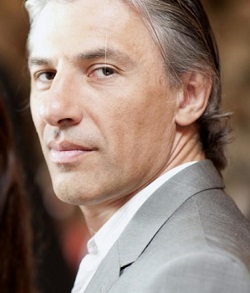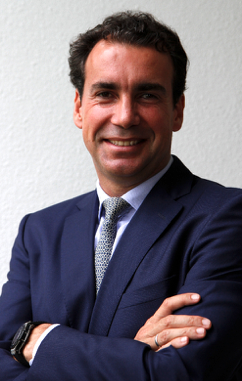Transcripts
 Erik: Joining me now is HonTe Investments Chief Investment Officer, Alex Gurevich. And, of course listeners, you know Alex is a big fixed-income expert and interest rate guy. Obviously, Alex, we need to get deep on interest rates in today’s interview.
Erik: Joining me now is HonTe Investments Chief Investment Officer, Alex Gurevich. And, of course listeners, you know Alex is a big fixed-income expert and interest rate guy. Obviously, Alex, we need to get deep on interest rates in today’s interview.
But first, what’s on everybody’s mind is it was FOMC [Federal Open Market Committee] day.
Give us the rundown. Obviously a 25-point basis cut. What’s your perspective on what happened here? What does it mean? And how do we fit this in to the big picture?
Alex: Good to be back.
So, yes, today is FOMC day. And whenever we are in the middle of our cycle, or actually action cycle – that is right now in the middle of an easing cycle – every FOMC day is very important.
Not only in terms of what happens today, what exactly they do, but also people look for clues as to the next meeting. Because it’s not so easy for them to change course between meetings.
 Erik: Joining me now is Diego Parrilla, the portfolio manager with Quadriga Asset Managers. And a good friend and co-author with our good friend Daniel Lacalle. Daniel and Diego co-authored The Energy World is Flat: Opportunities from the End of Peak Oil published in 2014. And Diego is the sole author of The Anti-Bubbles: Opportunities Heading Into Lehman Squared and Gold’s Perfect Storm.
Erik: Joining me now is Diego Parrilla, the portfolio manager with Quadriga Asset Managers. And a good friend and co-author with our good friend Daniel Lacalle. Daniel and Diego co-authored The Energy World is Flat: Opportunities from the End of Peak Oil published in 2014. And Diego is the sole author of The Anti-Bubbles: Opportunities Heading Into Lehman Squared and Gold’s Perfect Storm.
Diego prepared an excellent slide deck to accompany today’s interview and I strongly encourage you to download it. Registered users will find the download link in your Research Roundup email. If you’re not yet registered, just go to our home page at macrovoices.com and look for the red button that says Looking for the Downloads? next to Diego’s picture.
Diego, thanks so much for joining us. I want to go ahead and jump right in with the investment thesis that you focus your work around. Of course, you co-authored that book with Daniel Lacalle with respect to The Energy World is Flat: Opportunities from the End of Peak Oil. And your new book is called The Anti-Bubbles. Tell us what those are about.
 Erik: Joining me now is Stephanie Pomboy, founder of MacroMavens and very possibly the hardest-to-get interview guest that we’ve dealt with to date.
Erik: Joining me now is Stephanie Pomboy, founder of MacroMavens and very possibly the hardest-to-get interview guest that we’ve dealt with to date.
I know when Grant Williams interviewed you the first time, you made a joke about playing hard to get. I thought you were kidding until we’ve been through this. So thank you for finally coming and joining us for an interview, Stephanie.
Stephanie: Oh, it’s my pleasure. Actually, I sort of fashion myself the JD Salinger of macroeconomics. So don’t take it personally. I just prefer to remain hiding under my desk most of the time. But thank you for having me.
Erik: Well, we pride ourselves on digging out the people that are actually worth listening to and I certainly respect you in that category.
So let’s talk about the big macro picture. I think the big question on everybody’s mind is, you know, a lot of us have been saying that we’re very late in the economic cycle and it’s time for markets to roll over. Markets aren’t rolling over.
So what’s going on here? How do you see this picture?
 Erik: Joining me now is Tian Yang, Head of Research for Variant Perception.
Erik: Joining me now is Tian Yang, Head of Research for Variant Perception.
As the Variant Perception guys always do for us, Tian has put together a fantastic slide deck to accompany today’s interview. So I strongly recommend that you download it. Registered users will find the download link in your Research Roundup email. If you’re not yet registered, just go to our home page at MacroVoices.com and look for the red button that says Looking for the Downloads? next to Tian’s picture.
Tian, in past interviews, we’ve gone into depth on the process that you guys use at Variant Perception and it’s absolutely fascinating content. So, for the benefit of any new listeners that may not be familiar with what you do at Variant Perception and the way that you use leading indicators and so forth to approach markets, I want to encourage them to go back to some of Jonathan Tepper’s previous interviews on prior dates on MacroVoices where we do this in detail.
But for the benefit of anyone who hasn’t already had the indoctrination, could you give us a quick review of the process that you use and how it flows into the current market environment?
 Erik: Joining me now is One River Asset Management Chief Investment Officer, Eric Peters. Eric is known for his weekend reading notes (wkndnotes) and I’ve been particularly enjoying reading a couple of them this week that I want to talk about.
Erik: Joining me now is One River Asset Management Chief Investment Officer, Eric Peters. Eric is known for his weekend reading notes (wkndnotes) and I’ve been particularly enjoying reading a couple of them this week that I want to talk about.
We have secured permission to share those with our listeners, so you’ll find the download links in your Research Roundup email. If you’re not registered yet just go to our home page at macrovoices.com. Look for the red button that says Looking for the Downloads? next to Eric’s picture on the home page.
Eric, It’s great to have you back on the show. I want to talk about some of your weekend reading notes because they resonate very much with a number of themes that I’ve been thinking about.
I wanted to start with monetary policy and how long the monetary paradigm, if you will, can last. It seems to me like, really for the last 10 years, we’ve been propping up asset markets with what I think is easy money policy, with quantitative easing and very accommodative monetary policy.
But a number of people have said, look, there is only so far monetary policy can take you. Feels to me like we’re coming to the end of that path.
Are we at the end of the path? And if so what comes next?
MACRO VOICES is presented for informational and entertainment purposes only. The information presented in MACRO VOICES should NOT be construed as investment advice. Always consult a licensed investment professional before making important investment decisions. The opinions expressed on MACRO VOICES are those of the participants. MACRO VOICES, its producers, and hosts Erik Townsend and Patrick Ceresna shall NOT be liable for losses resulting from investment decisions based on information or viewpoints presented on MACRO VOICES.
